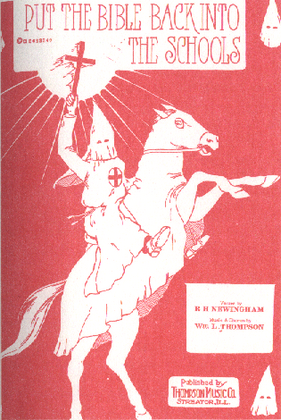See the Amazon.com entry for the book & IN Harmony: Sheet Music from Indiana.
Obviously being Christian does not necessarily imply racism. But many, if not most, racist groups in the American Deep South during this period where explicitly Christian. These days most Christian groups will say racism is bad. Of course it was not "God" that changed, but the civil rights movement that changed attitudes and perceptions.
I warn people to be careful about thinking themselves superior to 1920s racists. They were a product of their time trying, like most people, to live their lives. It is easy to sit back in 2009 and think one is superior. Most whites in the Southern United States thought they were in the right. It would be unwise to think that if one was born into that culture that one would not have shared their folly. Of course one should have much less sympathy to those living today who maintain any such views: their fallacies have been exposed in the most public ways.
Faith is often considered as a way of knowing — a way to understand the world. Yes I know that not all believers do especially the liberal theologians. But I think it is fair to say that for most active church goers believe that faith is in some way a way of knowing or at a minimum that God can guide their actions. Indeed God is usually asked for guidance and wisdom during prayer and that the case for most every Christian sect and not just the fundamentalists.
I have no reason to think that most ordinary members of the Klan were not sincere in their faith. If faith is a way of knowing then one has to wonder why faith did not inform them that in almost every way imaginable — factually, ethically, and legally — they were in the wrong. What happened when they asked God for wisdom and guidance? Certainly atheists and other disbelievers in such cultures often, though far from always, shared the racial prejudices of their neighbors, but they did not claim to have faith or an infallible God telling them the answers. As for the believers, I certainly do not think it is too much expect that God — for whom the believers claim to have a personal relationship with — to provide the right answer. Certainly the God that was preached about in sermons and Sunday school of the Baptist churches that I attended as child would have. And if faith or God's guidance could not do then what today is considered something fairly simple, what good is it?
And do not try to use the Bible for help either. Racists used one set of Bible verses and interpretations while non-racists used others. One would think that if Bible is the infallible guide that it would have among the requirements not to eat pork, not to wear clothes of wool and linen woven together, or to do any work on the Sabbath some commandments that explicitly address slavery and ethnic questions that have repeatedly come up in human history:
- Thou shalt not own slaves or pay your servant less than a fair wage.
- Thou shalt not mistreat any persons because of skin color, nationality, ancestry, where they were born, or sex because all people are of equal value.
